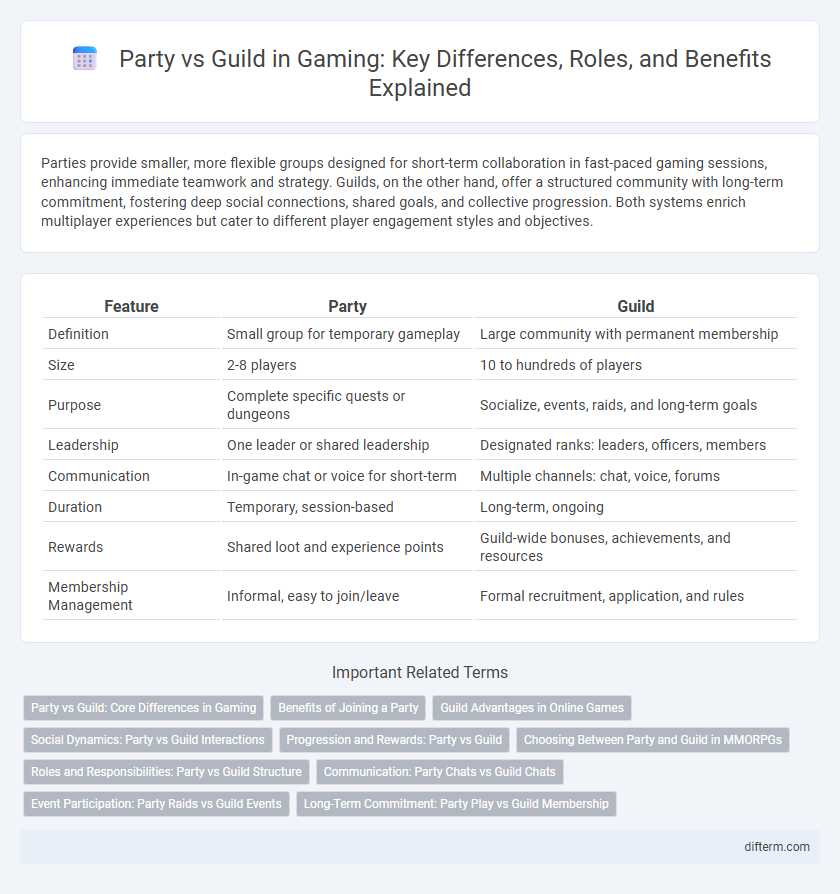Parties provide smaller, more flexible groups designed for short-term collaboration in fast-paced gaming sessions, enhancing immediate teamwork and strategy. Guilds, on the other hand, offer a structured community with long-term commitment, fostering deep social connections, shared goals, and collective progression. Both systems enrich multiplayer experiences but cater to different player engagement styles and objectives.
Table of Comparison
| Feature | Party | Guild |
|---|---|---|
| Definition | Small group for temporary gameplay | Large community with permanent membership |
| Size | 2-8 players | 10 to hundreds of players |
| Purpose | Complete specific quests or dungeons | Socialize, events, raids, and long-term goals |
| Leadership | One leader or shared leadership | Designated ranks: leaders, officers, members |
| Communication | In-game chat or voice for short-term | Multiple channels: chat, voice, forums |
| Duration | Temporary, session-based | Long-term, ongoing |
| Rewards | Shared loot and experience points | Guild-wide bonuses, achievements, and resources |
| Membership Management | Informal, easy to join/leave | Formal recruitment, application, and rules |
Party vs Guild: Core Differences in Gaming
Parties and guilds differ primarily in scale and function within gaming communities; parties are small, temporary groups formed for specific quests or missions, enabling quick, cooperative gameplay. Guilds represent larger, more permanent organizations that provide social structure, long-term goals, and resource sharing across multiple gaming sessions. This distinction impacts player experiences, with parties emphasizing immediate teamwork and guilds fostering ongoing collaboration and community building.
Benefits of Joining a Party
Joining a party in gaming offers immediate cooperation and faster matchmaking, enabling players to complete quests and defeat enemies more efficiently. Parties promote strong social interaction and real-time communication, enhancing teamwork and strategic gameplay. This setup is ideal for players seeking a short-term, goal-oriented gaming experience with a close-knit group.
Guild Advantages in Online Games
Guilds in online games offer superior organizational structure and long-term social engagement compared to parties, enabling coordinated large-scale activities such as raids and territory control. They often provide exclusive resources, shared assets, and persistent progression systems enhancing player growth and team synergy. Guilds foster a stable community with leadership roles, mentorship opportunities, and collaborative strategies that elevate overall gameplay experience beyond temporary party setups.
Social Dynamics: Party vs Guild Interactions
Parties in gaming offer tight-knit, short-term social interactions centered on immediate objectives such as quests or battles, fostering quick cooperation among a few players. Guilds provide a broader, long-term community with structured hierarchy and shared goals that promote sustained social bonds and collective identity. These differing dynamics impact player engagement by balancing transient collaboration with enduring support networks.
Progression and Rewards: Party vs Guild
Parties in gaming offer short-term progression with focused quests and immediate rewards, ideal for quick-leveling and cooperative challenges. Guilds provide long-term progression through collective achievements, exclusive content, and shared resources, enhancing sustained growth and more substantial rewards. The structured environment of guilds often unlocks advanced gear, special events, and leadership roles unavailable to casual parties.
Choosing Between Party and Guild in MMORPGs
Choosing between a party and a guild in MMORPGs depends on gameplay goals and social preferences. Parties offer short-term collaboration for specific quests or dungeons, emphasizing immediate combat synergy and quick rewards. Guilds provide long-term commitment with broader social interaction, access to exclusive resources, and organized events that enhance overall game progression.
Roles and Responsibilities: Party vs Guild Structure
Parties in gaming typically consist of a small group of players focused on short-term objectives such as completing a dungeon or quest, with roles centered around combat, healing, and support during these limited engagements. Guilds operate as larger, organized communities with structured leadership, assigning responsibilities like event planning, resource management, recruitment, and long-term progression across various game modes. While parties emphasize tactical coordination among a few members, guilds provide a framework for sustained collaboration, social interaction, and collective achievement within the game.
Communication: Party Chats vs Guild Chats
Party chats offer real-time, focused communication among a small group of players during specific gaming sessions, enhancing coordination and strategy execution in high-intensity scenarios. Guild chats provide a broader communication platform for larger communities, supporting social interaction, event planning, and long-term collaboration beyond immediate gameplay. Effective use of party and guild chats improves teamwork by balancing instant tactical dialogue with ongoing strategic discussions.
Event Participation: Party Raids vs Guild Events
Party raids offer focused, short-term collaboration ideal for tackling specific dungeon challenges, enabling swift coordination among a small group of players. Guild events typically involve larger-scale, long-term activities such as territory wars or guild-wide quests, fostering sustained teamwork and strategic planning. Participation in guild events often yields broader rewards and strengthens community bonds beyond the immediate combat objectives seen in party raids.
Long-Term Commitment: Party Play vs Guild Membership
Party play offers short-term collaboration focused on immediate objectives and flexible player participation, ideal for casual or spontaneous gaming sessions. Guild membership demands long-term commitment, fostering a consistent community with shared goals, structured events, and deeper social bonds that enhance player retention. The enduring engagement in guilds supports sustained skill development and collective progression, while parties prioritize adaptability and quick teamwork.
party vs guild Infographic

 difterm.com
difterm.com